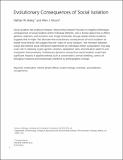Files in this item
Evolutionary consequences of social isolation
Item metadata
| dc.contributor.author | Bailey, Nathan William | |
| dc.contributor.author | Moore, Allen | |
| dc.date.accessioned | 2019-07-16T23:41:03Z | |
| dc.date.available | 2019-07-16T23:41:03Z | |
| dc.date.issued | 2018-08 | |
| dc.identifier | 255139879 | |
| dc.identifier | 8cf07e41-2701-4dd7-8486-7e885f7672ae | |
| dc.identifier | 85048448525 | |
| dc.identifier | 000441042100006 | |
| dc.identifier.citation | Bailey , N W & Moore , A 2018 , ' Evolutionary consequences of social isolation ' , Trends in Ecology and Evolution , vol. 33 , no. 8 , pp. 595-607 . https://doi.org/10.1016/j.tree.2018.05.008 | en |
| dc.identifier.issn | 0169-5347 | |
| dc.identifier.uri | https://hdl.handle.net/10023/18105 | |
| dc.description | Funding: Natural Environment Research Council (NE/L011255/1) (NWB). | en |
| dc.description.abstract | Social isolation has profound impacts. Most animal research focuses on negative phenotypic consequences of social isolation within individual lifetimes. Less is known about how it affects genetics, selection, and evolution over longer timescales, though ample indirect evidence suggests that it might. We advocate that evolutionary consequences of social isolation be tested more directly. We suggest that the ‘index of social isolation’, the mismatch between actual and optimal social interaction experienced by individuals within a population, may play a key role in releasing cryptic genetic variation, adaptation rates, diversification patterns, and ecosystem-level processes. Evolutionary dynamics arising from social isolation could have significant impacts in applied settings such as conservation, animal breeding, control of biological invasions, and evolutionary resilience to anthropogenic change. | |
| dc.format.extent | 13 | |
| dc.format.extent | 599035 | |
| dc.language.iso | eng | |
| dc.relation.ispartof | Trends in Ecology and Evolution | en |
| dc.subject | Conservation | en |
| dc.subject | Indirect genetic effects | en |
| dc.subject | Invasion biology | en |
| dc.subject | Loneliness | en |
| dc.subject | Social selection | en |
| dc.subject | Sociogenomics | en |
| dc.subject | QH301 Biology | en |
| dc.subject.lcc | QH301 | en |
| dc.title | Evolutionary consequences of social isolation | en |
| dc.type | Journal item | en |
| dc.contributor.sponsor | NERC | en |
| dc.contributor.institution | University of St Andrews. School of Biology | en |
| dc.contributor.institution | University of St Andrews. Centre for Biological Diversity | en |
| dc.identifier.doi | 10.1016/j.tree.2018.05.008 | |
| dc.description.status | Peer reviewed | en |
| dc.date.embargoedUntil | 2019-07-17 | |
| dc.identifier.grantnumber | NE/L011255/1 | en |
This item appears in the following Collection(s)
Items in the St Andrews Research Repository are protected by copyright, with all rights reserved, unless otherwise indicated.

